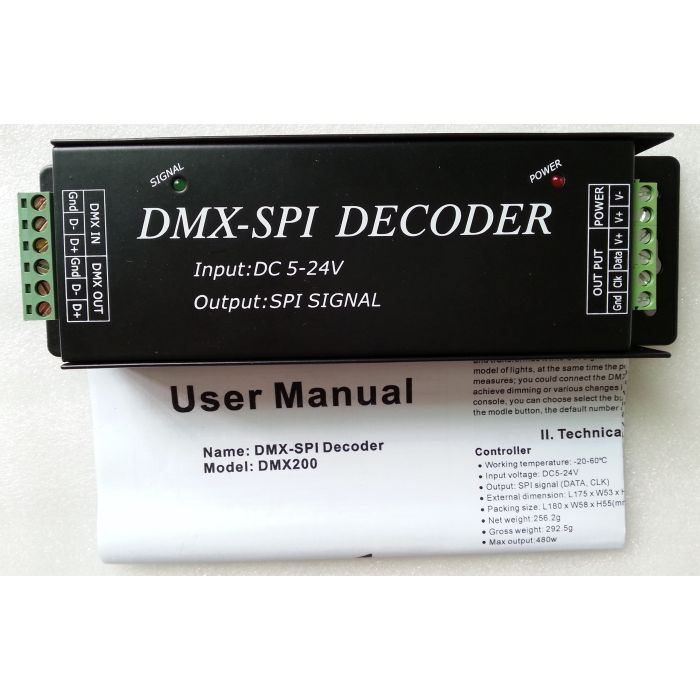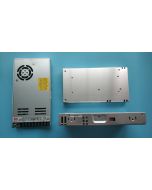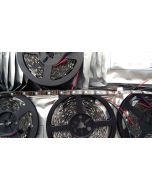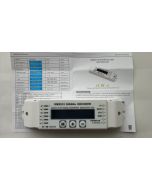DMX200 DMX-SPI digital signal LED decoder
- Buy 100 for £12.72 each and save 6%
- Buy 1000 for £11.76 each and save 13%
Click here to view the detailed DMX200 decoder information
Support 10 kinds of different pixel IC, you can choose IC by the dip switch
Click here to view the detailed DMX200 SPI decoder information
Summarization
The DMX-SPI decoder adopts the advanced micro control unit, it receives standard DMX-512 digital control signal that is widely used in the international and transformes it into SPI signal to drive LED, it supports 10 kinds of different model of lights, at the same time the port of DMX signal has lightning protection measures; you could connect the DMX decoder with DMX digital console to achieve dimming or various changes in procedures. Not connected with DMX console, you can choose select the built-in 35 kinds of default patterns through the mode button, the default points is 1024.
Controller
Working temperature: -20~60 Celsius
Input voltage: DC 5~24V
Output: SPI signal (DATA, CLK)
External dimension: L175 x W53 x H27(mm)
Packing size: L180 x W58 x H55(mm)
Net weight: 257g
Gross weight: 293g
Max output: 480W
parameters settings of decoder
You can modify the light type that decoder supports through the DIP switch. The decoder can support 10 kinds of SPI strips in market. As follows:
|
Number |
Model |
Signal line |
|
1 |
LPD6803 |
DATA, CLK |
|
2 |
TM1803 |
DATA |
|
3 |
TM1809 |
DATA |
|
4 |
TM1812 |
DATA |
|
5 |
UCS1903 |
DATA |
|
6 |
WS2811 |
DATA |
|
7 |
WS2801 |
DATA CLK |
|
8 |
TLS3001 |
DATA |
|
9 |
TLS3008 |
DATA |
|
10 |
P9813 |
DATA, CLK |
If there are 2 signal lines, then you need to connect the ground wire, clock line, data line with GND CLK DATA; if it is 1 signal line, then just need to connect the ground wire, data line with GND DATA.
Remark: if the V+ voltage of strip is the same with controller input voltage, then it can directly connect with the controller V+; if not, you need to connect another power supply.
Since the specifications of light in the market are different, the sequence of RGB may be different, the sequence of some lights is RGB, some sequence is RBG, GRB and so on, so the DIP switch provides modification of RGB sequence.
Mode changes are as the following table:
|
Mode |
Mode instruction |
|
1 |
Static red |
|
2 |
Static green |
|
3 |
Static blue |
|
4 |
Static yellow |
|
5 |
Static purple |
|
6 |
Static cyan |
|
7 |
Static white |
|
8 |
Red horse race to right |
|
9 |
Green horse race to right |
|
10 |
Blue horse race to right |
|
11 |
Three base color stroboflash |
|
12 |
Seven-color stroboflash |
|
13 |
Three base color jumpy change |
|
14 |
Seven-color jumpy change |
|
15 |
Three mixing color three color wave by wave running forward direction |
|
16 |
Seven-color wave forward direction |
|
17 |
Red trail forward direction |
|
18 |
Red trail backward direction |
|
19 |
Green trail forward direction |
|
20 |
Green trail backward direction |
|
21 |
Blue trail forward direction |
|
22 |
Blue trail backward direction |
|
23 |
Seven-color running trail backward direction |
|
24 |
Seven-color running trail forward direction |
|
25 |
Change color purple-red-purple forward direction |
|
26 |
Change color yellow-green-yellow forward direction |
|
27 |
Change color cyan-green-cyan forward direction |
|
28 |
Change color purple-blue-purple forward direction |
|
29 |
Change color cyan-blue-cyan forward direction |
|
30 |
Change color white-red-white forward direction |
|
31 |
Change color yellow-red-yellow forward direction |
|
32 |
Change color red-yellow-red |
|
33 |
Change color green-cyan-green |
|
34 |
Change color blue-purple-blue |
|
35 |
Automatically play 8~34 |








